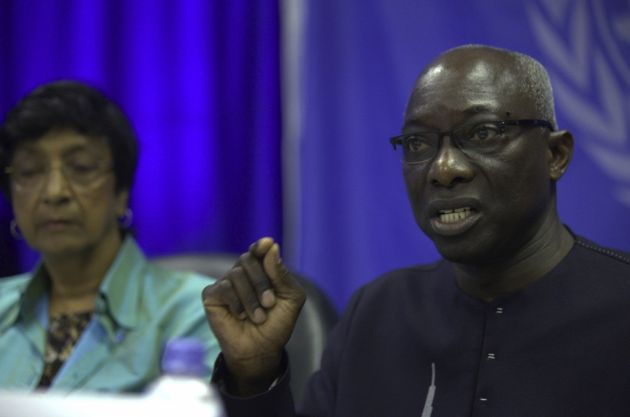South Sudan NGOs 'committed' to humanitarian work, but say fighting must stop

A group of non-governmental organzsations (NG0s) says it remains committed to providing humanitarian services in South Sudan but needs a cessation of hostilities to carry out its work.
Meanwhile, the World Council of Churches said Thursday a high-level ecumenical delegation representing church organizations will arrive in Juba, South Sudan on Friday, 2 May.
The delegation will meet with church leaders and government officials, urging immediate actions for peace and reconciliation.
Among those in the delegation will be WCC general secretary, Rev. Olav Fykse Tveit; the ACT Alliance general secretary John Nduna; the, World YWCA head, Nyaradzayi Gumbonzvanda, and the WCC's former general secretary Rev. Samuel Kobia.
The NGO group includes major church aid agencies such as Caritas, Christian Aid, the Lutheran World Federation, DanChurch Aid and the Baptist Relief Agency. It expresses deep concern at the serious escalation in violence in South Sudan.
The group says the conflict will not end through its commitment to humanitarian efforts.
"All parties to the conflict must immediately commit to respecting the cessation of hostilities agreement without exception, resume genuine talks in Addis Ababa and work towards a negotiated, inclusive political settlement," the statement says.
It says the conflict has resulted in the deaths of hundreds of civilians and is "exacerbating an already profound humanitarian crisis."
"We strongly condemn all attacks that have taken place against civilians during this conflict, most recently at the UN peacekeeping base in Bor on 17th April and in the town of Bentiu on 15th-18th April.
"Civilians have been targeted on the basis of their ethnicity, others indiscriminately killed, and many subjected to unspeakable grave human rights abuses including rape," the statement says.
The NGOs note that widespread violence against civilians has reportedly been committed since December 2013, but that recent events display "a serious deepening of the conflict and callous disregard for civilian life and international humanitarian law."
Lutheran World Federation assistant general secretary for International Affairs and Human Rights, Ralston Deffenbaugh, noted that the people of South Sudan suffered 50 years of civil war during which millions were killed or displaced.
"The hope brought by the 2005 peace accord and the 2011 transition to independence has been brutally dashed," Deffenbaugh said. "The leaders of the armed factions in South Sudan should put down their weapons immediately, resolve their differences peacefully, and treat their fellow citizens, their fellow human beings, with dignity and respect," Deffenbaugh said.
He called for those around the world who have influence on the armed factions to urge them to cease the violence immediately.
So far an estimated 1 million people have been forced from their homes; of these more than 90,000 people are sheltering in the United Nations Mission in South Sudan (UNMISS) bases across the country.
Thousands of people have fled to the UN peacekeeping base in Bentiu for fear of reprisal attacks in the past week.
Many areas outside the main towns remain inaccessible due to security conditions, and it is feared that the number of people affected by the violence and in need of humanitarian assistance could be significantly higher.
It is estimated that 3.2 million are at risk of extreme food insecurity, a number that will only rise in coming months.
"NGOs call on all armed actors to uphold their responsibilities under international humanitarian and human rights law, refrain from targeting civilians, respect the sanctity of civilian spaces, and permit immediate and unconditional humanitarian access to civilians in areas they control."
International NGOs and South Sudanese civil society signatories:
Acted
ACORD
Adeso
Africa Educational Trust
Amref Health Africa
Baptist Relief Agency (BARA)
Better World Campaign
Care International
Caritas Switzerland and Luxembourg
CESVI
Christian Aid
COFAS
Concern Worldwide
Cordaid
COSV
Danish Church Aid
Food for the Hungry
Finn Church Aid
Health Net TPO
InterNews
International Medical Corps
International Rescue Committee
INTERSOS
Johanniter International
Kissito Healthcare International
Lutheran World Federation
Malteser International
Mercy Corps
Mentor initiative
Mine Action Group (MAG)
National Relief and Development Corps (NRDC)
Non Violent Peace Force
Norwegian Refugee Council
Oxfam
Pact
PAH
Plan International
People in Need
Relief International
Red R
Rural Action Against Hunger
Sign of Hope
SNV
Sudan Evangelical Mission
Tearfund
Terres Des Hommes
Theso
Troicaire
World Relief
World Vision
Windle Trust International